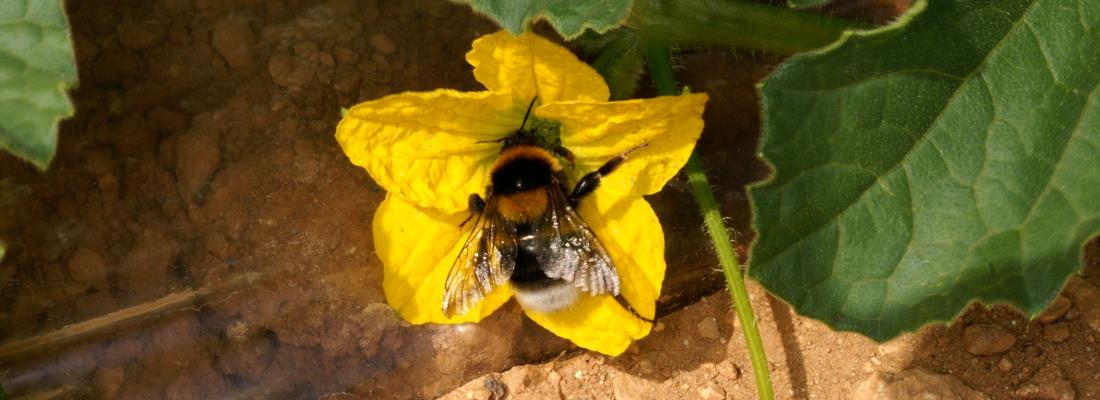Reading time 2 min
Pollinator decline across the globe: the verdict from an international group of scientific experts
Published on 11 May 2022

International experts give their opinion on the globe’s pollinator populations
What would become of our food supply without pollinators? While there is global consensus on the latter’s planet-wide decline, there is less clarity over what exactly is happening in the different regions of the world and how to respond appropriately. To understand the particular strategies that will be required to protect pollinators in each region, the IPBES (Intergovernmental Science-Policy Platform on Biodiversity and Ecosystem Services) and the CBD (Convention on Biological Diversity) convened a meeting of international experts from across the world, facilitated by Dr Simon Potts at the University of Reading. Their views were recorded using the DELPHI method, designed to provide expert collective advice to guide decision-making. This allowed the group of scientists, including Adam Vanbergen, Deputy Director of INRAE’s Agroecology Unit, to produce an assessment of the current state of pollinator populations in the different regions of the world, including the immediate risks they face and the impacts of these on the ecosystem services they provide to humans.
Multiple drivers identified – from intensive farming to climate change
In an assessment produced in 2016, the IPBES had already examined the ecosystem relationships between pollinators and their environments. The reality is that over 75% of our food crops depend on pollinators, mostly the wild pollinators that play a critical role in maintaining the biodiversity necessary for agriculture. However, a significant decline in pollinators has been observed, mostly among the wild populations, and these figures can include only those species where there is sufficient data to determine their status (less than half of European species, for example). The main drivers for the decline are linked to changes in habitat and to pesticide use in intensive farming. Climate change exerts an additional pressure, with increasing influence on the distribution of pollinator populations and seasonal activity patterns. There is thus a clear need for specific information on how each factor affects the different continents, and on the consequences for food security in each region.
Collecting the additional data needed for a detailed analysis of the risks associated with pollinator decline
With the main global drivers for pollinator decline already established in the 2016 study, the current IPBES expert consultation used the DELPHI method to create a risk profile for each continent by systematically scoring the individual impacts of each driver (impact of a deficit in pollination, yield instability, etc).
Tackling the pressures on pollinators caused by changes in the landscape and by pesticide use was the number-one political priority, with high scores (‘very important’) for these two drivers on most continents. Loss of pollinator diversity was considered to be a risk globally, threatening the ecosystem services provided by pollinators and leading, for example, to increased instability in the yields of pollinator-dependent crops (a risk considered to be serious for four out of the six continents). And although the future impacts of climate change cannot be known with certainty, there is a strong probability that rising temperatures will interact in time with other drivers of pollinator decline. The best course of action would therefore be to direct research and policy actions towards mitigation and adaptation.
A major stumbling block is the vast extent of the gaps in the available data and knowledge concerning most impacts in many regions, especially in Africa. This assessment exercise reveals the continued high level of uncertainty over the impact of the decline in pollinators on ecosystem services, while it is impossible to avoid individual bias in the judgements made by expert contributors to the exercise. Making up the data gaps for these regions and for less-studied pollinator populations is an essential task if we are to improve knowledge and reduce uncertainty.
REFERENCES
- Dicks, L. V., Breeze, T. D., Ngo, H. T., Senapathi, D., An, J., Aizen, M. A., Basu, P., Buchori, D., Galetto, L., Garibaldi, L. A., Gemmill-Herren, B., Howlett, B. G., Imperatriz-Fonseca, V. L., Johnson, S. D., Kovács-Hostyánszki, A., Kwon, Y. J., Lattorff, H. M. G., Lungharwo, T., Seymour, C. L., Vanbergen, A. J. & Potts, S. G. 2021. A global-scale expert assessment of drivers and risks associated with pollinator decline. Nature Ecology & Evolution. 5, 1453–1461 (2021) https://doi.org/10.1038/s41559-021-01534-9
- Potts, S. G., Imperatriz-Fonseca, V., Ngo, H. T., Aizen, M. A., Biesmeijer, J. C., Breeze, T. D., Dicks, L. V., Garibaldi, L. A., Hill, R., Settele, J. & Vanbergen, A. J. 2016. Safeguarding pollinators and their values to human well-being. Nature, 540, 220–229. https://doi.org/10.1038/nature20588
